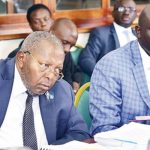The Court of Appeal has overturned a decision by the High Court that retired the former Coordinator of Intelligence Agencies David Sejusa from the Uganda Peoples Defense Forces (UPDF).
The decision to retire him had been made in 2016 by High Court Judge Margaret Oumo Oguli in relation to a suit filed by Gen Sejusa (formerly Tinyefunza) against the UPDF Commissions and Promotions board for refusing to retire him from the military following his application.
In his suit, filed in November 2015, Sejusa indicated that he had earlier applied for retirement through the board and received no response within the mandatory 90-days.
He asked the court to order the UPDF Commission and the Attorney General (AG), to hand him a discharge certificate as a sign that he has retired from the army.
Sejusa had demanded Shs1 billion in compensation and damages for normal loss, as well as punitive damages for consistent torture and arrest. But the army through Senior State Attorney Max Kalemera argued that Sejusa was still an active serving officer, a status that remains unchanged until one gets a discharge certificate.
The judge of the High Court declared that Gen Sejusa is no longer subject to military law and ordered government to pay him Shs750 million as damages for violating his rights when he was arrested, detained, prosecuted and denied bail by the General Court Martial.
The Attorney General ran to the Court of Appeal to challenge the ruling.
A panel of three Court of Appeal Justices comprised of Christopher Izama Madrama, Irene Mulyagonja and Monica Mugenyi quashed Oguli’s orders on February 14, 2022.
According to the Justices, the High Court expanded its administrative jurisdiction to engage itself in matters concerning the retirement of officers which is a preserve of the UPDF Commission’s, Promotions Board as per the UPDF Act.
To the Justices, Sejusa ought to have waited for feedback from the board before petitioning the High Court seeking to be discharged because there were pending correspondences between his lawyers and the President.
“lt is debatable whether the failure by the Board to communicate a decision within 90 days should be taken as a refusal of the resignation or as consent. What is important is that the Board is required to communicate in writing. The requirement to communicate is mandatory. This is taken from the wording of section 66 (2) of the UPDF Act,” the court ruled.
According to Judges, there was no decision from the Board that Sejusa was challenging in the High Court and therefore there was nothing to subject to judicial review. Instead, he says there was a delay in communication which was a violation of section 66 of the UPDF Act.







